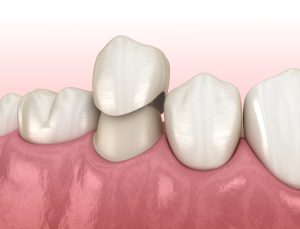Dental Crown Restorations Can Give You a Beautiful Smile
Dental crowns restore damaged or decayed teeth, helping countless patients achieve beautiful, healthy smiles. Crowns can be made from various materials and are custom-made to fit each patient’s unique needs.
At Northwind Dental, our Wasilla restorative dentist, Dr. Dawson, offers dental crowns to help patients like you meet their oral health needs. Learn more about crowns by reading the guide below and discover if this restorative solution is the right fit for your smile! You can also call our Southcentral Alaska dental practice by dialing (907) 373-2440 and scheduling your dental crown consultation.
What Are Dental Crowns?
Dental crowns, also known as tooth caps or tooth crowns, are prosthetic devices placed over damaged or decayed teeth to restore their function, shape, and appearance. They’re custom-made to fit over the entire tooth, from the gum line to the chewing surface, and are usually made of porcelain, ceramic, metal, or a combination of these materials.
When Are Dental Crowns Necessary?
There are multiple dental issues that a crown can fix. Dr. Dawson may recommend dental crowns for various reasons, including:
- Protecting a Weak Tooth: If a tooth has been weakened by decay, a large filling, or a root canal, a dental crown can provide additional support and prevent the tooth from breaking.
- Restoring a Broken or Damaged Tooth: A dental crown can be used to restore a tooth that has been broken, cracked, or severely worn down.
- Covering a Dental Implant: After a dental implant is placed, a dental crown is often used to cover the implant and create a natural-looking tooth replacement.
- Supporting a Dental Bridge: Crowns can be used to support a dental bridge, which is used to replace missing teeth.
- Improving the Appearance of a Tooth: Dental crowns can be used as a cosmetic solution to improve the appearance of misshapen, discolored, or poorly spaced teeth.
Signs You Need Dental Crowns
Some signs that you may need a dental crown include:
- Tooth pain or sensitivity
- A cracked or chipped tooth
- A large filling that needs to be replaced
- A tooth that has had a root canal
- A tooth that’s misshapen or discolored
Benefits of Dental Crowns
Some of the benefits of dental crowns include:
- Protection: Tooth crowns can help protect weak or damaged teeth from further damage or decay.
- Restoration: Tooth crowns can restore the function and appearance of damaged teeth.
- Durability: Tooth crowns are strong and durable, and can last for many years with proper care.
- Versatility: Tooth crowns can be used for a variety of dental problems, from restoring a broken tooth to covering a dental implant.
- Aesthetics: Tooth crowns can be made to match the color and shape of your natural teeth, creating a natural-looking and aesthetically pleasing result.
If you’re wondering how dental crowns may benefit you, contact our Wasilla dentist today to schedule your next appointment!
Types of Dental Crowns
There are various types of dental crowns, ensuring that each patient receives the solution they need to restore their smile.
Porcelain Crowns
Porcelain crowns are made of a tooth-colored material that can be matched to the shade of your natural teeth, making them a popular choice for front teeth. They’re biocompatible and produce a natural, lifelike appearance.
Metal Crowns
Metal crowns are made of gold, nickel, or other metal alloys. They’re extremely durable, can withstand heavy biting forces, and last a long time. However, their metallic color makes them less popular for front teeth.
Porcelain-fused-to-Metal Crowns (PFM)
PFM crowns are made by fusing a metal base with a porcelain coating, providing the strength of the metal and the aesthetics of all-porcelain crowns. They can be used for both front and back teeth.
Zirconia Crowns
Zirconia crowns are made of a durable, biocompatible material that is resistant to chipping and cracking. They can be matched to the color of your natural teeth and are an ideal option for back teeth.
Same-Day Crowns
Same-day crowns, also known as CEREC crowns, are a type of dental crown that can be fabricated and placed in a single dental visit. This is in contrast to traditional dental crowns, which typically require multiple appointments and the use of temporary crowns while waiting for the permanent crown to be fabricated in a dental lab.
Costs of Dental Crowns at Northwind Dental
The cost of dental crowns can vary based on several factors. Contact our dental team today and we’ll gladly discuss pricing and help you figure out the best way to pay for your treatment.
The final cost may vary depending on:
- The complexity of your case
- Any additional procedures required (such as root canals)
- Your dental insurance coverage
Dental Crown Maintenance
Dr. Dawson emphasizes the importance of proper care for your crowns to ensure their longevity and maintain your oral health. Here are some key tips for caring for your tooth crowns:
- Practice Good Oral Hygiene: Brush twice daily with a soft-bristled toothbrush and fluoride toothpaste. Pay special attention to the area where the crown meets the gumline.
- Floss Daily: Use dental floss or interdental cleaners to remove plaque and food particles around your crowns.
- Avoid Hard Foods: Refrain from chewing on ice, hard candies, or other extremely hard foods that could damage your crowns.
- Protect Against Grinding: If you grind your teeth, ask Dr. Dawson about a custom nightguard to protect your crowns.
- Regular Dental Check-ups: Visit Northwind Dental for bi-annual dental check-ups and professional cleanings to ensure your crowns remain in good condition.
- Address Issues Promptly: If you notice any discomfort or changes with your crown, contact Dr. Dawson immediately.
Frequently Asked Questions
Generally, dental crowns can last anywhere from five to 15 years or even longer with proper care. The lifespan of your dental crown will depend on various factors such as the material used, oral hygiene routine, and the amount of wear and tear the crown is subjected to. Porcelain and ceramic crowns tend to have a longer lifespan than metal or resin-based crowns.
Getting a dental crown should not be painful as the procedure is usually performed with a local anesthetic. Some patients may experience some discomfort or sensitivity during or after the dental crown procedure. Your dentist can prescribe pain medication or recommend over-the-counter pain relievers to manage any discomfort.
Generally, it takes two dental visits to complete the dental crown process. The total time it takes to place a dental crown on a tooth can vary depending on the specific case and the dentist’s technique. Your dentist will provide a treatment timeline at your initial consultation.
Yes, it’s possible to get a dental crown placed in one day using a technology called CEREC (Chairside Economical Restoration of Esthetic Ceramics). This technology allows the dentist to create and place a custom crown in a single dental visit. The dentist will take digital impressions of the tooth, design the crown using computer-aided design (CAD) software, and then use an in-office milling machine to fabricate the new crown.
Discover if Dental Crowns Are Right for You, Call Now!
Dental crowns are a popular and effective way to restore damaged or decayed teeth. With advances in technology, there are now various types of dental crowns available, each with its unique advantages and disadvantages. Contact our Wasilla office at (907) 373-2440 today to schedule a consultation with Dr. Dawson.




